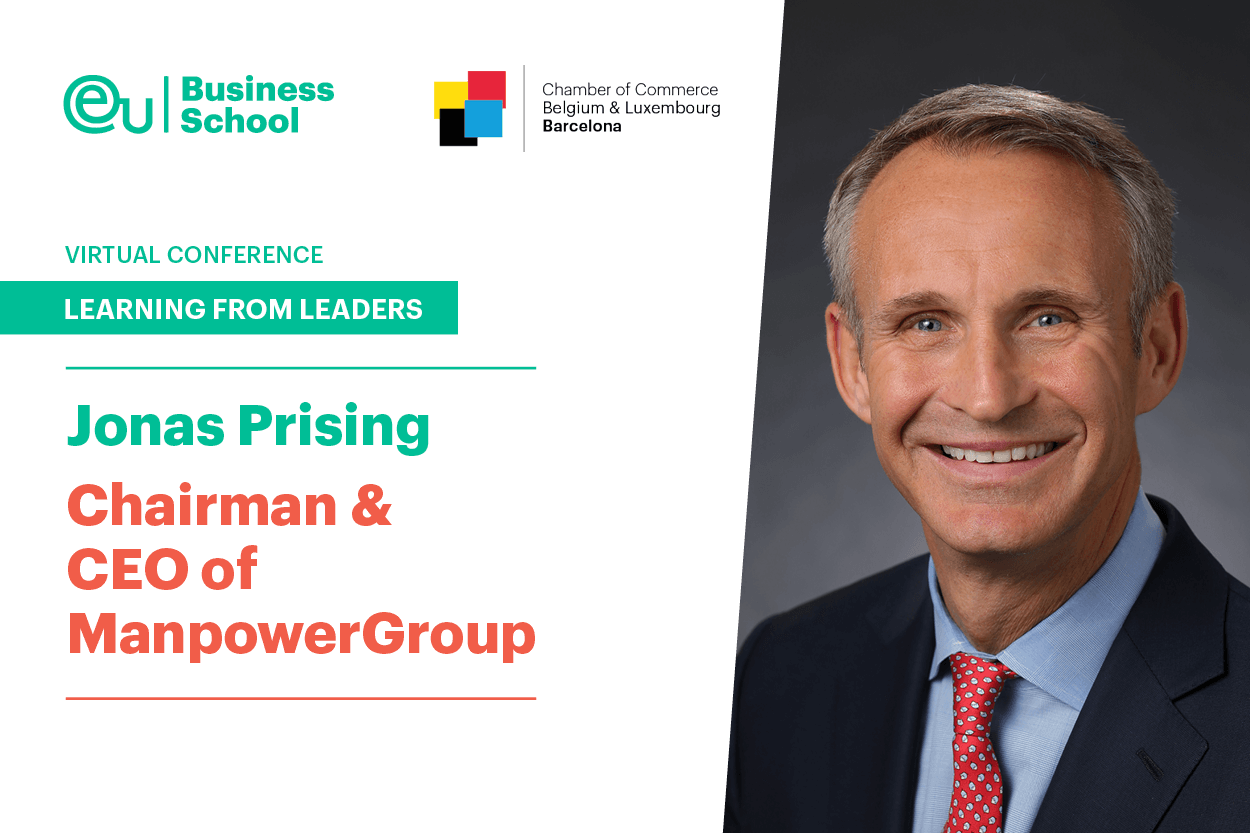“We’re all in the same storm, but we’re not in the same boat.” – Mr. Jonas Prising, Chairman & CEO of ManpowerGroup
Jonas Prising, the chairman and CEO of global staffing agency ManpowerGroup, has lots to say about the future of work. As head of an agency that helps people in over 75 countries and territories find employment, Prising’s insights into team building, the gig economy, and environmental, social, and governance (ESG) leadership are extremely valuable. In our Learning From Leaders session, hosted by Peter Vanham, author of “Before I Was CEO,” Prising shared his expertise in these areas and gave attendees a stellar overview of current and future workplace trends.

Employment Outlook
Prising assured the audience that labor markets are recovering steadily after the pandemic despite a slowdown over the past three or four months. This is nothing compared to what ManpowerGroup experienced in March 2020: a 35% loss of business in just three weeks. Although this was an unprecedented crisis—the first such in the company’s 75-year history—Prising noted that they handled the situation gracefully, making a quick and effective pivot to a remote model in mere weeks.
Having a Moral Compass
Prising was very clear about prioritizing employee protection, detailing the company’s change in focus from socioeconomic cycles to the health and safety of its employees. He mentioned how ManpowerGroup helped keep employees motivated, informed, and engaged with daily virtual discussions over coffee.
But Prising’s commitment to bolstering his employees isn’t a recent, pandemic-inspired development. He believes leadership should always be capable, think and evaluate rationally, be empowered to take action, and do it all in the context of others before oneself. “I am honored to be leading a big organization,” he explained, “but my job and accountability is to ensure that I protect the company today and prepare it for a better future with better talent.”
While Prising admits that “grey zones” exist in moral judgments, some things are definitively right or wrong. Using vaccine response to COVID as an example, Prising went on to recommend that leaders leverage data and insights with their values, ensuring that any positions they take are not only backed by data and science, but that they also benefit employees. “I think you can navigate most issues with that lens.”
The Importance of Environmental, Social, and Governance (ESG) Leadership
ESG leadership is primarily concerned with ensuring investments and other operations meet environmental, social, and governance-related standards. ESG is an important evaluation tool for investors, particularly socially conscious ones, when choosing companies in which to invest. Part of a CEO’s responsibilities involved weighing in on political and ideological issues more than ever before, in order to accommodate this cultural change. “You can bring it back to…stakeholder capitalism, that a company does not solely exist to provide profits and dividends for your shareholders that own the company. But you have the responsibility to ensure that… you are also contributing to society and the broader stakeholders in your company—your employees, the communities in which we live and work, and so forth.”
Prising is primarily concerned with the “social” aspect of ESG. He sees the most workforce polarization between those who have in-demand skills and those who don’t. As the workplace continues to change rapidly, due to the pressures of globalization and technological advancement, Prising sees value in helping people upskill, as a failure to do so could result in “significant social issues.”
“We’re all in the same storm, but we’re not in the same boat,” is how Prising summarized the current employment situation, “and that’s where we are very focused on helping find ideas and solutions to this reskilling and upskilling at the scale that we think is going to be needed to bridge that gap over the coming years.”
The Future of Work: Shifting Norms
When asked to apply his expertise to the topic of current and future work trends, Prising was optimistic about labor growth in 2022. He also sees a tendency for continued growth in “non-traditional” forms of employment, such as freelance or part-time work. According to Prising, the idea that norms are shifting to the point where the gig economy will overtake traditional full-time employment is not accurate. Still, these non-traditional forms of work is growing much more quickly due to economic and social volatility and the aforementioned changes in tech and globalization.
That said, Prising cautions employers that this shift towards less traditional working conditions requires companies to allow more flexibility in order to keep talented employees. He also cautions that gig work must be better regulated for the sake of workers.
Advice to Students
During the interactive portion of the conference, Prising’s advice to students often centered on learning and following one’s passions. A broad portfolio of capabilities and the ability to learn through experience are what he outlined as particularly attractive to employers.
Prising also gave a fairly level-headed prediction that while automation and technology may replace jobs, they are never eliminated. Instead, the job market requires new roles to be filled, and employees displaced by technology are typically absorbed by the positions technology creates. Again, upskilling plays a role here.
The conference closed with Prising delivering some quick final words of wisdom and recommending two seminal business texts: True North by Harvard Business School professor Bill George, and Good to Great by Jim Collins. But if you want to learn even more about business and work on your own upskilling, check out EU Business School. We offer a broad range of foundation, bachelor’s, master’s and MBA programs specifically designed to address the latest industry demands. From cloud computing to entrepreneurship to fashion and luxury business, we ensure you will graduate with the skill set needed to excel in the workplace of the future.










